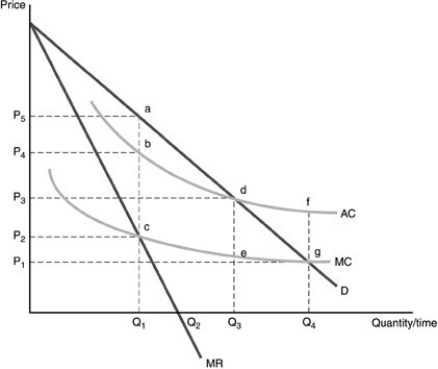Exam 27: Regulation and Antitrust Policy in a Globalized Economy
Exam 1: The Nature of Economics348 Questions
Exam 2: Scarcity and the World of Trade-Offs411 Questions
Exam 3: Demand and Supply451 Questions
Exam 4: Extensions of Demand and Supply Analysis401 Questions
Exam 5: Public Spending and Public Choice362 Questions
Exam 6: Funding the Public Sector201 Questions
Exam 7: The Macroeconomy: Unemployment, Inflation, and Deflation413 Questions
Exam 8: Measuring the Economys Performance416 Questions
Exam 9: Global Economic Growth and Development290 Questions
Exam 10: Real GDP and the Price Level in the Long Run298 Questions
Exam 11: Classical and Keynesian Macro Analyses368 Questions
Exam 12: Consumption, Real GDP, and the Multiplier452 Questions
Exam 13: Fiscal Policy274 Questions
Exam 14: Deficit Spending and the Public Debt146 Questions
Exam 15: Money, Banking, and Central Banking516 Questions
Exam 16: Domestic and International Dimensions of Monetary Policy357 Questions
Exam 17: Stabilization in an Integrated World Economy321 Questions
Exam 18: Policies and Prospects for Global Economic Growth228 Questions
Exam 19: Demand and Supply Elasticity412 Questions
Exam 20: Consumer Choice459 Questions
Exam 21: Rents, Profits, and the Financial Environment of Business445 Questions
Exam 22: The Firm: Cost and Output Determination391 Questions
Exam 23: Perfect Competition432 Questions
Exam 24: Monopoly386 Questions
Exam 25: Monopolistic Competition307 Questions
Exam 26: Oligopoly and Strategic Behavior308 Questions
Exam 27: Regulation and Antitrust Policy in a Globalized Economy310 Questions
Exam 28: The Labor Market: Demand, Supply and Outsourcing376 Questions
Exam 29: Unions and Labor Market Monopoly Power319 Questions
Exam 30: Income, Poverty, and Health Care304 Questions
Exam 31: Environmental Economics299 Questions
Exam 32: Comparative Advantage and the Open Economy282 Questions
Exam 33: Exchange Rates and the Balance of Payments285 Questions
Select questions type
The law passed by Congress in 1914 that was designed to sharpen or define further the vagueness of the Sherman Act is called
(Multiple Choice)
4.8/5  (42)
(42)
Which of the following will NOT be true if the antitrust laws are successful?
(Multiple Choice)
4.9/5  (44)
(44)
Suppose OSHA requires a factory to install specific safety equipment to reduce the number of injuries in the factory. Would the number of accidents necessarily decline? Why or why not?
(Essay)
4.9/5  (31)
(31)
 -Refer to the above figure. If the government requires the natural monopolist to charge the efficient price, it will charge price
-Refer to the above figure. If the government requires the natural monopolist to charge the efficient price, it will charge price
(Multiple Choice)
4.8/5  (32)
(32)
Which of the following statements can correctly be made about social regulation? I. Extensive social regulation may have an anticompetitive effect.
II) The benefits of social regulation are easier to measure than are the costs of social regulation.
(Multiple Choice)
4.8/5  (35)
(35)
Regulation that keeps the rate of return in the industry competitive is known as
(Multiple Choice)
4.9/5  (39)
(39)
Which of the following is NOT a government response to asymmetric information?
(Multiple Choice)
4.9/5  (40)
(40)
Which of the following is the BEST example of a natural monopoly?
(Multiple Choice)
4.9/5  (33)
(33)
What is the relationship between the Sherman Antitrust Act and the Clayton Act?
(Multiple Choice)
4.8/5  (38)
(38)
This agency develops and enforces environmental standards for air, water, toxic waste, and noise.
(Multiple Choice)
4.9/5  (39)
(39)
Since 1970, federal expenditures by regulatory agencies have
(Multiple Choice)
4.9/5  (36)
(36)
The regulation of the prices charged by insurance companies is known as
(Multiple Choice)
4.7/5  (34)
(34)
In average cost pricing, the natural monopoly would have to set price equal to
(Multiple Choice)
4.8/5  (36)
(36)
One of the agencies responsible for enforcement of antitrust policy is
(Multiple Choice)
4.8/5  (36)
(36)
Which of the following is NOT an objective of economic regulation?
(Multiple Choice)
4.8/5  (41)
(41)
Acme Inc. found a tricky way to conform to the letter of the law with respect to new EPA regulations, even though they violated the spirit of the law. This is called
(Multiple Choice)
5.0/5  (31)
(31)
Showing 101 - 120 of 310
Filters
- Essay(0)
- Multiple Choice(0)
- Short Answer(0)
- True False(0)
- Matching(0)